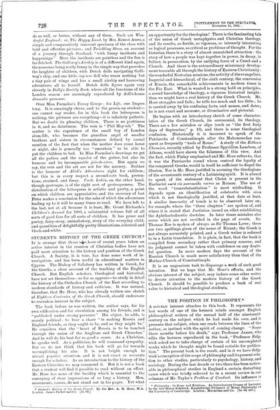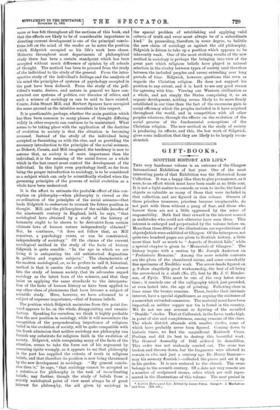THE POSITION IN PHILOSOPHY.*
A DOUBLE interest attaches to this book. It represents the last words of one of the keenest minds amongst English philosophical writers of the second half of the nineteenth century on the subject which he had made his own, and it presents that subject, when one reads between the lines of the author, as instinct with the spirit of coming change. " Some three months before his death," says Professor James, who edits the lectures reproduced in the book, "Professor Sidg- wick asked me to take charge of certain of his uncompleted works which he thought might be found suitable for publica- tion." The present book is the result, and in it we have Sidg- wick's conception of the scope of philosophy and its present rela- tion to other studies, particularly to psychology, history, and sociology. During the last decade or two there has been notice- able in philosophical studies in England a certain disturbing cause which was briefly referred to in a recent review in our columns of Mr. Taylor's Problem of Conduct. Its influence is • Philosophy : its Scope and Relations. An Introductory Course of Lectures by the late Henry Sidgwick, Knightbridge Professor of Moral Philosophy in the University of Cambridge. London Macmillan and Co. [6s. Gd. net.]
more or less felt throughout all the sections of this book, and that the effects are likely to be of considerable importance in directing current development is one of the principal convic- tions left on the mind of the reader as he notes the position which Sidgwick occupied as his life's work here closes. Hitherto throughout most departments of philosophical study there has been a certain standpoint which has been accepted without much difference of opinion by all schools of thought. The method has been to proceed from the study of the individual to the study of the general. From the intro- spective study of the individual's feelings and the analysis of his mind the principles of systems of psychology accepted in the past have been deduced. From the study of the indi- vidual's wants, desires, and nature in general we have con- structed our systems of politics, our theories of ethics, and such a science of sociology as can be said to have existed. Comte, John Stuart Mill, and Herbert Spencer have occupied the same ground as the intuitive moralists in this respect.
It is questionable, perhaps, whether the main position which has thus been common to many phases of thought differing widely in other respects can continue to be maintained. What seems to be taking place with the application of the doctrine of evolution to society is that the situation is becoming reversed. Instead of the study • of the individual being accepted as furnishing us with the clue, and as providing the necessary introduction to the principles of the social sciences, as Diderot, Cousin, and Mill imagined, the tendency is now to assume that, as society is of more importance than the individual, it is the meaning of the social forces as a whole which in the last resort must control the development of the individual; In this light even psychology itself, so far from being the proper introduction to sociology, is to be considered as a subject which can only be scientifically studied when the governing principles of the process of social evolution as a whole have been understood.
It is the effort to estimate the probable effect of this con- ception on philosophy—when philosophy is viewed as the co-ordination of the principles of the social sciences—that leads Sidgwick to endeavour to unmask the future position in thought. Mill, and the philosophers of the middle decades of the nineteenth century in England, held, lie says, " that sociological laws obtained by a study of the history of humanity ought to be shown to be derivative from certain ultimate laws of human nature independently obtained." But, he continues, " it does not follow that, as Mill conceives, a psychology exists, or can be constructed, independently of sociology." Of the claims of the current sociological method in the study of the facts of history Sidgwick is quite sensible : " In the age in which we are living it is antiquating the old unhistorical dogmatism in politics and cognate subjects." The characteristic of the modern sociological, or, as he prefers to call it, historical, method is that it carries the ordinary methods of science into the study of human society, that its advocates regard sociology as the latest born of the sciences, and that they insist on applying the same standards to the interpreta- tion of the facts of human history as have been applied to any other class of phenomena that have become a subject of scientific study. Here, however, we have advanced to a subject of supreme importance,—that of human beliefs.
The position which Sidgwick maintains from this point for- ward appears to be, on the whole, disappointing and unsatis- factory. Speaking for ourselves, we think it highly probable that the new position in sociology, while it will necessitate the recognition of the preponderating importance of religious belief in the evolution of society, will be quite compatible with the frank admission that neither sociology nor philosophy can furnish any substitute for religious faith in the evolution of society. Sidgwick, while recognising many of the facts of the situation, seems to take the force out of his argument by assuming (quite wrongly, as it appears to us) that philosophy in the past has supplied the criteria of truth in religious beliefs, and that therefore its position is now being threatened by the new development in sociology. " My general conclu- sion then is," he says, " that sociology cannot be accepted as a substitute for philosophy in the task of co-ordinating beliefs; nay further, though the study of beliefs from a strictly sociological point of view must always be of greal interest for philosophy, the aid given by sociology in
the special problem of establishing and applying valid criteria of truth and error must always be of a subordinate kind." In proceeding, therefore, in some degree, to belittle the new claim of sociology as against the old philosophy, Sidgwick is driven to take up a position which appears to be inherently weak. One of the most striking results of the new method in sociology is perhaps the bringing into view of the great part which religious beliefs have played in natural selection in the rivalry between types of society (and therefore between the included peoples and races) extending 'over long periods of time. Sidgwick, however, questions this even as regards the Christian religion. He does not support his position to any extent, and it is hard to see any good reason for agreeing with him. Viewing our Western civilisation as a whole, and not simply the States comprising it, as an organic development, nothing seems likely to be more firmly established in our time than the fact of the enormous gain in social efficiency which the peoples included in it have acquired throughout the world, and in competition with all other peoples whatever, through the effects on the evolution of the social process of the fundamental conceptions of the Christian religion. The new method in the study of society is producing its effects, and this, the last work of Sidgwick, gives some indication that they are likely to be largely recon- structed.























































 Previous page
Previous page